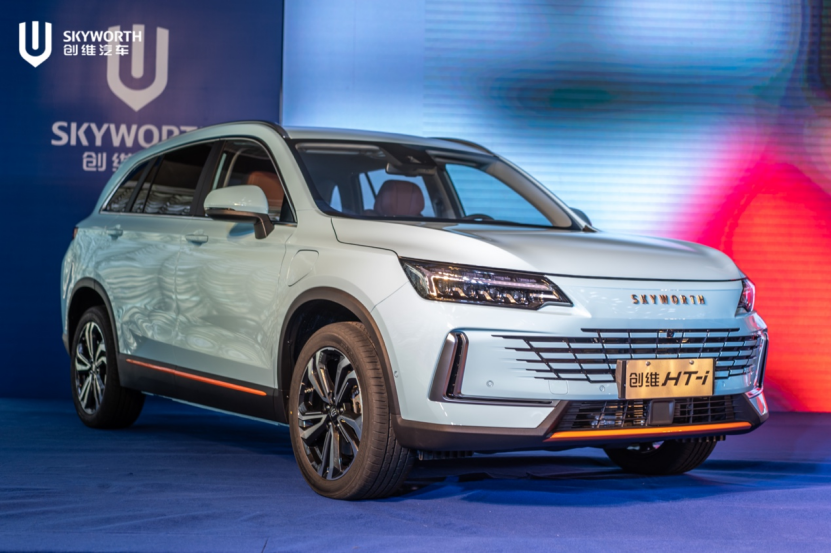Author | Lingfang Wang
Editor | Shiyun Zhu
Will a product with a BYD-like hybrid system, lower price, and longer pure electric driving range be very attractive?
On September 5th, Skyworth held a launch event for the HT-i super hybrid SUV. At this event, Skyworth Auto launched a total of 7 models, including 3 configurations, 2 powertrain options, and 1 exclusive custom model, with prices ranging from 146,800 to 2.428 million RMB after subsidies.
It is worth noting that the HT-i’s power performance is completely in line with the BYD Song Plus DM-i’s, except that it uses soft-pack battery cells from Funeng Technology.
Skyworth has focused its main efforts on research and development in areas such as wire-controlled chassis, attempting to break through the bottleneck in overseas markets and support L5 autonomous driving needs by 2026 when it iterates up to version 3.0.
Skyworth Auto’s Executive Vice President and Co-founder Jia Fan also set a small goal for the company’s development: to achieve a sales target of 100,000 units by 2023, driving towards the express lane of development.
Huang Hongsheng, founder of Skyworth Group and Skyworth Auto, set an even longer-term goal in a recent media interview:to sell 1 million units by 2030, including 500,000 units overseas.
Longer Pure Electric Range, Lower Price
The biggest highlight of this car is the hybrid system jointly developed with BYD.
Normally, car manufacturers usually purchase battery systems from BYD. Skyworth is currently the only car manufacturer to use the hybrid system from BYD. The Skyworth HT-i is equipped with an electric-hybrid system jointly developed by Skyworth Auto and Fudi Power, which took 28 months of hard work, with the world’s highest compression ratio engine of 15.5:1. It also adopts multiple advanced technologies such as Atkinson cycle and EGR exhaust gas recirculation system, achieving 43.04% thermal efficiency.
On the battery side, it uses Funeng Technology and Guoxuan High-tech.
Compared with the Song Plus DM-i, the price of the Skyworth HT-i is lower, but the pure electric driving range is longer, and the size is larger.
Regarding pure electric range, the Skyworth HT-i has pure electric driving ranges of 115km and 200km respectively, while the Song Plus DM-i has ranges of 51km and 100km, exactly double that of BYD.
In terms of size, the Skyworth HT-i’s length, width, and height are 4698/1908/1696mm, and its wheelbase is 2800mm. Overall, it is larger than the Song Plus DM-i and is positioned as a midsize SUV.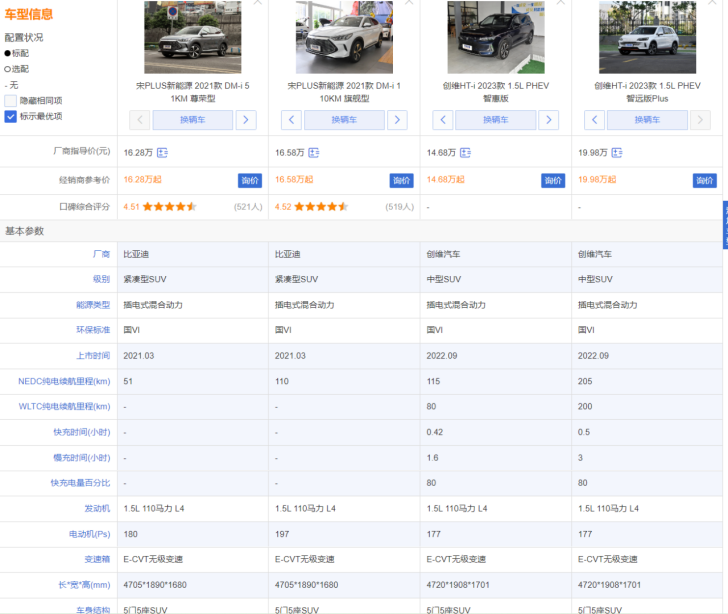
In addition, Jia Fan also revealed that they are also demonstrating the construction of an engine production line. However, he believes that this is a long-term strategy and cooperation should be the focus at the beginning.
Self-developed line-controlled chassis
Skyworth Auto has its own logic in the field of research and development.
Skyworth Auto focuses on line-controlled chassis. Line-controlled chassis is the foundation of high-level intelligent driving cars and is also a highly monopolized area by foreign capital companies. Wu Longba, President and Co-founder of Skyworth Auto, pointed out that the development of line-controlled chassis is a “bottleneck” in the industry due to the high R&D cost, long development cycle, the core data of the underlying system not being open to the public, and low compatibility with vehicles.
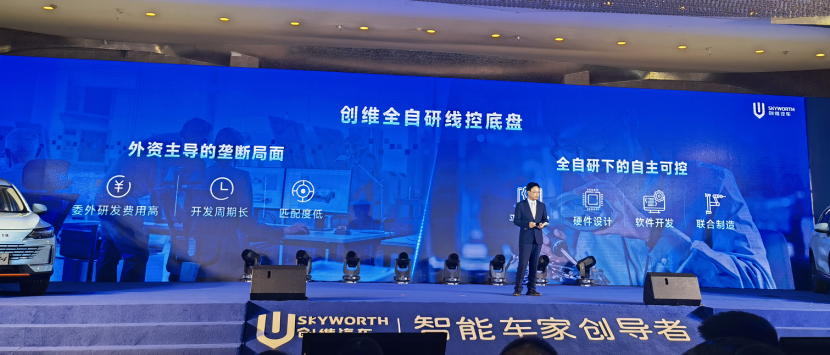
Skyworth Auto’s research and development plan in the field of line-controlled chassis is divided into three stages. In 2020, Skyworth completed the development of the line-controlled chassis 1.0 system, which can meet the needs of level L2 autonomous driving. In the second stage, Skyworth plans to complete the development of the 2.0 system in 2024, which can support L3-L4 level autonomous driving. In 2026, the development of the 3.0 system will be completed to meet the needs of level L5 unmanned driving.

During the 1.0 phase of the line-controlled chassis, Skyworth Auto adopted a two-box scheme with a braking response time of less than 200 milliseconds, a braking distance of less than 36 meters, and a contribution rate of urban mileage greater than 25%, which can meet the daily needs of intelligent driving above L2 level.

In the 2.0 phase, Skyworth Auto will adopt a One-box scheme with a higher degree of integration, support autonomous driving of L3-L4 level, and achieve a braking response speed of less than 150 milliseconds, a braking distance of less than 34 meters and a contribution rate of urban mileage greater than 35%.
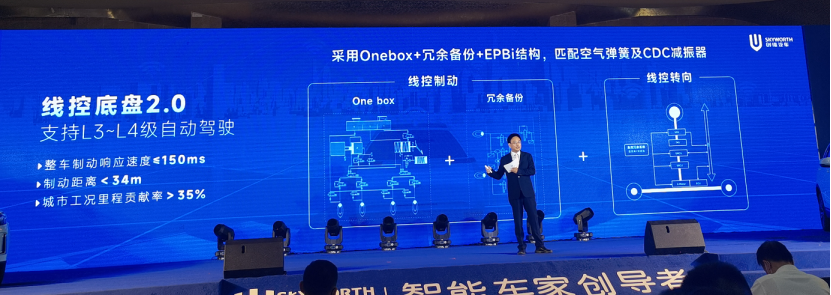
By 2026, Skyworth’s line-controlled chassis will enter the 3.0 stage, achieving a braking response speed of less than 100 milliseconds, a braking distance of less than 32 meters, and a contribution rate of urban mileage greater than 40%, supporting the needs of L5 level unmanned driving.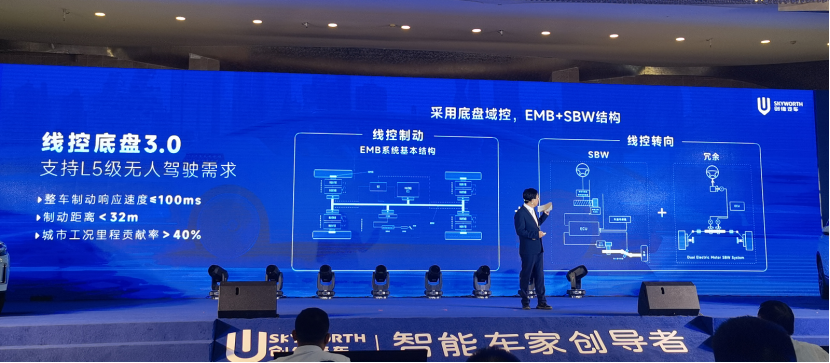
Additionally, on the three levels of intelligent cockpit, software vehicle network platform, and content service software, the software content service software, which includes the software for the vehicle system, instrument system, owner’s APP vehicle network platform, and car-home interconnection, will be independently developed by Skyworth Auto.
“2314 Strategy”
Skyworth Auto also announced its “2314 Strategy”: “2” represents two driving modes of pure electric and hybrid, “3” represents three major new energy passenger car platforms, namely BE, CE (the first model will be launched in 2025), and AE, “14” represents 14 new products to be launched.
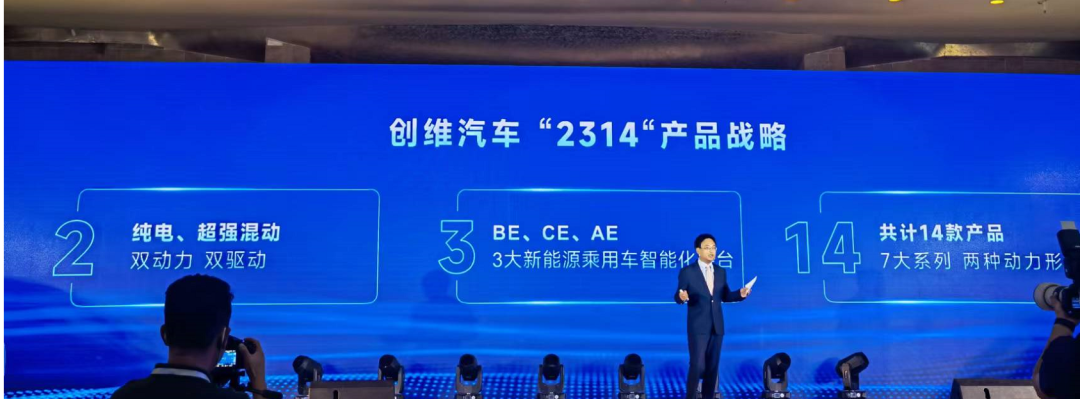
In terms of the market, Skyworth Auto will lay out two major new energy markets of pure electric and super intelligent hybrid, and focus on four important new energy passenger car markets of A-class SUV, B-class SUV, B-class sedan, and A-class sedan in the next 3-5 years.
In terms of products, Skyworth Auto will launch two major power systems of pure electric and intelligent plug-in, establish three new energy passenger car intelligent platforms of BE, CE, and AE3, and launch a total of 14 products in 7 series.
In terms of technology, Skyworth Auto’s technology ecosystem will achieve continuous iterations of wire-controlled chassis technology, intelligent cockpit, HT-i intelligent hybrid technology, and 2.0 active health system, to achieve a high degree of integration of people, cars, and homes.
As the “first SUV dedicated to entrepreneurs”, Skyworth Auto breaks through the positioning boundaries of new energy race intelligent travel tools, creating a new “third space” of mobile travel for the entrepreneurial user group focused on by Skyworth Auto.
In Huang Hongsheng’s view, competitiveness depends not only on products, but also on brand promotion and marketing. Huang Hongsheng believes that brand communication must be higher than the industry’s competitiveness, not just deep mining of products. For example, for a car, if the only highlight is good power, low noise, and long wheelbase, the product features are not outstanding, but Skyworth can demand consumers’ recognition through its active health technology.
Jia Fan believes that the competitiveness of auto companies comes from their understanding of the industry and differentiated competition.
Skyworth Auto understands users, car manufacturing, and car usage better: Skyworth Auto focuses on entrepreneurs, serves entrepreneurs, and delves deeper into entrepreneurs, committed to becoming a reliable partner for Chinese entrepreneurs in the process of starting a business.
In Jia Fan’s view, Skyworth Auto is different from other new car companies. Being under the Open Industry Group, it has 12-year car manufacturing genes which make it better at car manufacturing, and it has Skyworth Group’s ecological genes which make it better at car usage, compared to traditional car companies. This is Skyworth Auto’s advantage.The sales of BYD Song Plus DM-i are very hot and in short supply. It takes more than 4 weeks for delivery in Beijing area. Let’s wait and see whether Skyworth HT-i with better cost performance can replicate BYD’s success.
——END——
This article is a translation by ChatGPT of a Chinese report from 42HOW. If you have any questions about it, please email bd@42how.com.
